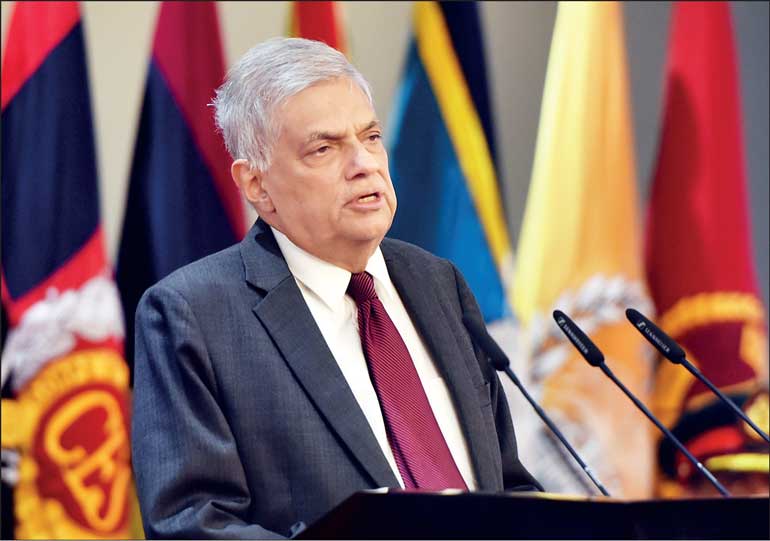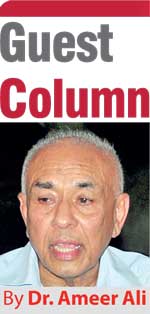Saturday Feb 07, 2026
Saturday Feb 07, 2026
Friday, 14 October 2022 00:00 - - {{hitsCtrl.values.hits}}

RW’s search for the mechanics to transform the economy to developed level has to go beyond pure economics - Pic by Ruwan Walpola
 IMF has warned of a global recession. CBSL Governor revealed that the Sri Lankan economy had contracted by 4.8% in the first half of 2022 and is expected to contract further in the second half. World Bank estimates the total contraction for Sri Lanka this year to be 9.2% and 4.2% next year. In the midst of all this the country has suffered another humiliation at UNHRC in Geneva. Yet, a brave faced President Ranil Wickremesinghe (RW) presented to the Parliament his fourfold strategy to stabilise the economy and raise it to “developed level”.
IMF has warned of a global recession. CBSL Governor revealed that the Sri Lankan economy had contracted by 4.8% in the first half of 2022 and is expected to contract further in the second half. World Bank estimates the total contraction for Sri Lanka this year to be 9.2% and 4.2% next year. In the midst of all this the country has suffered another humiliation at UNHRC in Geneva. Yet, a brave faced President Ranil Wickremesinghe (RW) presented to the Parliament his fourfold strategy to stabilise the economy and raise it to “developed level”.
What that level and when would that be raised were left to anyone’s imagination, although on an earlier occasion he indicated that the economy would be transformed into an export-oriented miracle through reusable energy and innovative technology to reach “First World status by 2048”.
His strategy includes, the already concluded staff level understanding with IMF, common agreement on debt restructuring with India, Japan and China, and other private creditors, going with IMF accreditation to a new round of loans from international agencies and friendly countries and after all that finished, to work out the mechanics of raising the country’s economy to developed level. Among the first three components of this debt driven growth strategy, it is the second one that is going to be crucial. The amount of IMF lending, including the already promised $ 2.9 billion, and funds from other sources are all contingent upon the successful agreement on debt restructuring.
Although Japan has promised to play a key role in this negotiation, it is China, with 52% share of the 66% non-Paris Club debt, that holds the key. Even if all three of RW’s strategic components work in Sri Lanka’s favour, his is an example of a debt driven growth strategy that has repeatedly proved in the developed world its increased vulnerability to external shocks. When governments thought that they were about to restart the growth process after the COVID shock and recession, the Ukraine War in Europe is creating another and hence the warning from IMF. Shocks from climatic change has now become a constant. This is why a small economy like Sri Lanka has to concentrate more in harnessing its domestic strength than to put all eggs in the basket of an export-oriented strategy. Even to make it export-oriented, the economy needs to produce surpluses from the most productive sectors. This is where the challenge lies.
Also, RW’s search for the mechanics to transform the economy to developed level has to go beyond pure economics. To start with, the country’s political, administrative and institutional structures and the ideology that drive their operation need radical overhaul, which is what the call for system or systemic change covers. Such a transformation is impossible with the current political leadership that stands to benefit from the status quo. Hence, the Aragalaya demand for “No 225”.
Given the limited calibre of a majority of present parliamentarians, who were once described by RW as people who did not know the difference between a sovereign bond and James bond, Prime Minster Dinesh Gunawardena’s baby, a 32-member national council aimed at proposing (a) short, medium and long term national priorities, and (b) short-term and medium-term common minimum program for economic stabilisation is an exercise in futility driven more by the need to maintain some semblance of unity amongst quarrelling factions than any expectation from them to deliver solutions to the country’s “polycrisis”.
The search for the mechanics of economic transformation should therefore be left to a team of experts outside the parliament who should be allowed to work independently on an integrated structural economic plan for the next five years with specific targets to be achieved annually in each sector. Economic planning has become a dirty concept in the neoliberal economic dictionary and has been ridiculed by free marketeers. But it should be made known that China, the second largest global economic powerhouse has continued to grow under successive Five-Year Plans and currently its fourteenth plan covering the period 2012-2025 is in operation. Once the total cost of the plan is known search for funding could then follow. Unfortunately, RW, his ministers and CBSL are spending too much time and effort in fulfilling IMF’s requirements while neglecting to do the homework for an internally resourced growth strategy.
This strategy should not be confused with the ideologically driven IS strategy under Sirimavo regime, which ended in a total disaster. Instead, this strategy calls for reforming the market structure itself that should operate as a partner in strengthening the potential of domestic productive sectors. This is what systemic change implies. There are soundings heard from NPP leaders along this line of thought. Will the leaderless Aragalaya youth join hands with NPP to achieve its objective through a transgenerational parliament?
One cannot expect miracles to happen from RW’s strategy. But he is not going to give up or move away from IMF set agenda while offering certain economic palliatives like reducing the prices of few consumer items here and increasing their supply there, to show that there is improvement. CBSL Chief Dr. Nandalal Weerasinghe also believes that the economy has somewhat stabilised. With OPEC’s cut in oil production, the war in Europe, climatic shocks and still lingering coronavirus the situation could change dramatically at any time.
In the meantime, it is a foregone conclusion that the Parliament will soon approve the proposal to voluntarily downgrade the country from lower-middle income to low-income status in order to avail itself for additional generosity from external donors if not lenders. This is another humiliation following the one experienced in Geneva. Given all this pessimism, RW’s hallucination with his debt driven growth strategy is no better than his predecessor’s hallucination with an alternative development path. Systemic change is therefore the only life saver for a country and economy throttled by “polycrisis”.
(The writer is attached to Murdoch Business School, Murdoch University, Western Australia.)